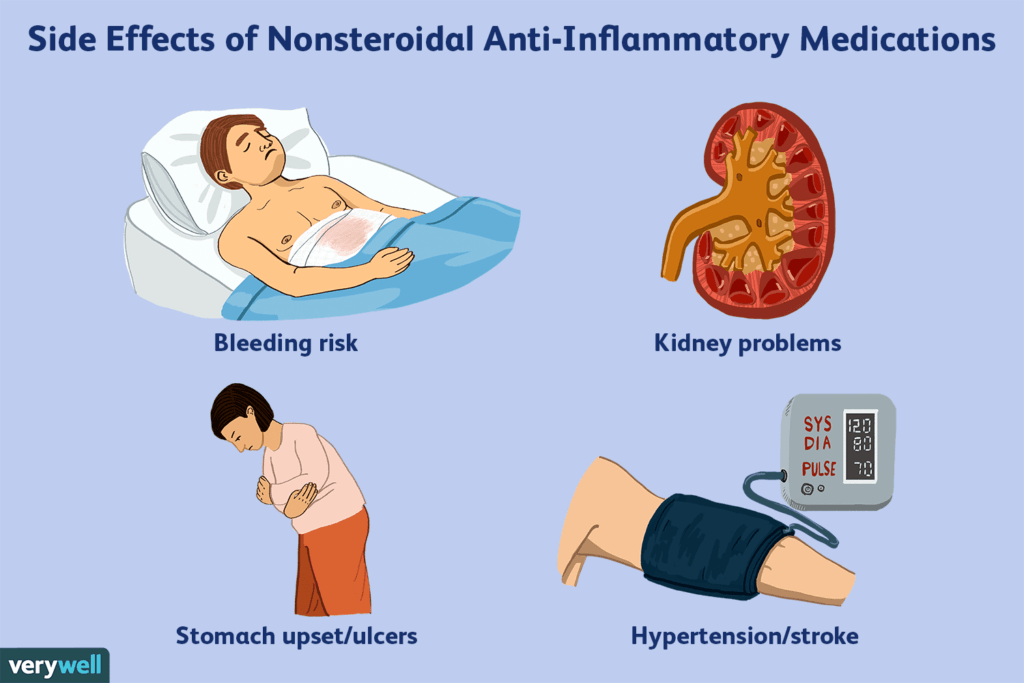Anti-inflammatory drugs are the most popular drugs for treating pain. How Popular? Thirty (30) million individuals either take them daily by prescription or purchased directly over the counter. But what do we really know about these popular drugs? If we aren’t careful, they can do as much or harm as good.
What are Anti-inflammatory Drugs?
Anti-inflammatory is the component of a material or treatment that reduces inflammation or swelling. Approximately half of analgesics (painkillers) are anti-inflammatory drugs, remedying pain by reducing inflammation. They work differently from opioids that affect the central nervous system by blocking pain signals to the brain.
There are two classifications of anti-inflammatory drugs: steroidal and non-steroidal (NSAID).
Steroidal Anti-inflammatory Meds
Steroidal anti-inflammatory drugs, known as Corticosteroids, are commonly referred to as steroids. They are a type of hormone and are usually used to manage rheumatologic (autoimmune) diseases, like rheumatoid arthritis, lupus, or vasculitis (inflammation of the blood vessels). The more common drugs include cortisone, methylprednisolone, and prednisone.
They additionally decrease immune system activity.
Steroids are a man-made version of chemicals that are normally made naturally in the human body known as hormones. They are designed to perform the same as hormones to reduce inflammation. They are different from anabolic steroids that are used by bodybuilders and athletes.
Since these drugs alleviate itching, redness, swelling, and allergic reactions, physicians frequently prescribe them to assist in the treatment of diseases such as allergies, arthritis, asthma, and lupus.
Corticosteroids resemble cortisol, which is a natural hormone that is formed by the body’s adrenal glands. The body requires cortisol to remain healthy. Cortisol is the main participant in a wide range of functions in the body that includes stress, immune response, and metabolism.
Side effects – As with all medications, some individuals will have some. These are most likely to occur if an individual is consuming a high dosage or has been on steroids for a long period.
Some side effects of steroids are below:
Tablets, liquids, and soluble tablets
- easy bruising
- mood swings
- problems sleeping
- pains in the stomach, heartburn, or indigestion
- Stretch marks.
- thinning of the skin
- increased appetite and weight gain
Gels and creams
- changes in skin color
- increased hair growth at the application site.
- stinging or burning where the cream has been placed
- stretch marks
- reduction of the skin layer
Eye drops and ointments
- stinging or burning in the eyes after inserting the drops
- a strange taste in the mouth after placing the drops in the eyes
Treatment with steroids may cause mood changes. An individual may experience highs or extreme lows. This may be more frequent in individuals with a history of mood disorders.
Taking steroid tablets for an extended period of time can make an individual more susceptible to get infections. If one feels feverish or under the weather, or develops any new symptoms after consuming steroids, it is crucial for them to tell their physician.
Individuals that develop shingles, measles, or chickenpox, come into contact with another individual who has any of these illnesses should see a physician right away. At times, these diseases can be severe in people who are taking steroids and may need additional care.
Steroids taken over an extended period of time can additionally cause muscles to become weaker.
Generally, steroid creams and eye drops do not typically cause serious side effects, but if taken for a long time or at a high strength, the ingredients can be absorbed into the blood and increase the risk of side effects that usually occur only with steroid tablets.
Additionally, Steroids can occasionally affect high blood pressure, epilepsy or, diabetes, so it is important to have blood pressure and blood sugar levels

checked occasionally and the physician may need to change the dosage of the steroid if needed. Steroids may occasionally cause diabetes or raised blood sugar even in individuals who have not had this condition formerly.
Steroids can also affect the eyes possibly by causing glaucoma to get worse or producing cataracts. They can also cause a serious problem with the eyes, which occurs when fluid collects in a part of the eye. If any changes are noticed in eyesight, such as vision becoming blurry, a physician should know as soon as possible.
Occasionally, steroids can be the cause another condition known as Cushing’s syndrome. This is what can cause the thinning of the skin, stretch marks, and also the face to become more round. However, it usually vanishes once the steroids are stopped.
In children and teenagers, steroids can on occasion cause growth to slow down, so it is best to have their height checked regularly. If growth is slowed, they may be referred to a specialist for advice and treatment.
The good news is side effects can be managed. Because steroids can cause weight gain and or have an increased appetite, an individual needs to keep an eye on their weight while taking them. Making sensible food choices and including some physical activity in the daily routine should help avoid weight gain.
Steroids can weaken bones, and this can lead to a condition known as osteoporosis. This is a condition that makes it more likely to fracture the bones, sometimes even after very minor falls or bumps.
A doctor may advise an individual to take calcium and vitamin D supplements or drugs called bisphosphonates, included with the steroids to help avoid this condition. Regular exercise, especially ones that involve the bones carrying the weight of the body, like walking, can additionally aid in reducing the risk of contracting osteoporosis.
Individuals should additionally make certain to get enough calcium in their diet, and avoid smoking and consuming excessive alcohol.
Non-Steroidal (NSAID) Anti-inflammatory Meds
NSAIDs can be very effective. They also lower inflammation, tend to work quickly, and generally have fewer side effects than corticosteroids.
NSAIDs work by blocking prostaglandins, which are substances that sensitize nerve endings and intensify pain during inflammation. Prostaglandins additionally play a role in controlling body temperature.
By inhibiting the effects of prostaglandins, NSAIDs help relieve pain and bring down the fever. Actually, NSAIDs can be useful in reducing many types of discomfort, including:
- backache
- headache
- inflammation and stiffness triggered by arthritis
and additional inflammatory conditions - menstrual aches and pains
- muscle aches
- pain after a minor surgery
- sprains or other injuries
NSAIDs are particularly important for addressing the symptoms of arthritis, such as joint pain, inflammation, and stiffness. NSAIDs tend to be inexpensive and easily accessible as many are available over the counter, so they are often the first medications prescribed to individuals with arthritis.
However, the prescription drug celecoxib (Celebrex) is frequently prescribed for the long-term addressing of arthritis symptoms. This is due to it being easier on the stomach than other NSAIDs.
There are two types of NSAIDs. NSAIDs prevent the enzyme cyclooxygenase (COX) from producing prostaglandins. The body produces two types of COX: COX-1 and COX-2.
COX-1 protects the stomach lining, whereas COX-2 causes inflammation. Most NSAIDs are nonspecific, which means indicate that they block both COX-1 and COX-2.
Nonspecific NSAIDs that are obtainable over the counter in the US include:
- naproxen (Aleve, Naprosyn)
- ibuprofen (Advil, Motrin, Midol)
- high-dose aspirin
Note: Low-dose aspirin is not typically categorized as an NSAID.
Nonspecific NSAIDs that are obtainable with a prescription in the US include:
- sulindac
- piroxicam (Feldene)
- oxaprozin (Daypro)
- nabumetone
- meloxicam (Vivlodex, Mobic)
- mefenamic acid (Ponstel)
- ketoprofen
- indomethacin (Tivorbex)
- flurbiprofen
- famotidine/ibuprofen (Duexis)
- etodolac
- diflunisal
- diclofenac (Zorvolex)
Selective COX-2 inhibitors are NSAIDs that obstruct more COX-2 than COX-1. Celecoxib (Celebrex) is presently the sole selective COX-2 inhibitor obtainable by prescription in the US.
Even though some NSAIDs can be purchased over the counter without a
prescription doesn’t mean they are harmless. There are potential side effects and risks, with the most common being gas, diarrhea, and upset stomach.
NSAIDs are recommended for occasional and short-term use. The risk for side effects increases the longer they are used.
It is wise to always consult with a healthcare provider before using NSAIDs, and they should not be mixed with a variety of NSAIDs at the same time.

The Stomach Issues
NSAIDs block COX-1, which aids with the protection of the stomach lining. Consequently, consuming NSAIDs can contribute to minor gastrointestinal problems, including:
- constipation
- diarrhea
- gas
- heartburn
- nausea and vomiting
- upset stomach
In more advanced cases, taking NSAIDs can irritate the stomach lining enough to cause an ulcer. Occasionally, ulcers may yet advance to internal bleeding.
If an individual should experience any of the following symptoms, they stop using the NSAID immediately and call their healthcare professional:
- severe abdominal pain
- black or tarry stool
- blood in the stool
The danger of developing stomach issues is higher for individuals who:
- have a history of stomach ulcers
- take blood thinners or corticosteroids
- are over the age of 65
- take NSAIDs frequently
Individuals can decrease the likelihood of increasing stomach issues by consuming NSAIDs with food, milk, or an antacid.
If an individual develops gastrointestinal issues, their healthcare professional may encourage them to change to a selective COX-2 inhibitor such as celecoxib (Celebrex). They are least likely to trigger stomach irritation than nonspecific NSAIDs.
Questions, comments, and concerns are welcomed below
Good health!!
I have been to doctors and have heard these terms’ anti-inflammatory’, ‘steroids’, ‘hormone’ and several other terms . Thank you for an article that explains what they are, how they work, and why we should take them. I am also reading that a lot of these virus complaints that we are currently dealing with have to do with ‘inflammation’. This word has become a buzzword and I am made to believe that a lot of what causes the body to malfunction is related to inflammation. Thank you for my medical tutorial.
Hi JJ – Anti-inflammatory drugs do play an important role in fighting inflammation. However, we must be careful to use them properly to avoid the long term harm they can cause from side effects.
Thanks for commenting!
This is a really important subject and it’s good to see it getting some attention. I have known people who struggled with migraines and had to find the right kind of balance between strong medications and things that were generally seen as more safe to take. It’s important to know both the benefits and the potential drawbacks before testing out new medications. Often there are many alternative therapies available and it is up to the patient to sort through them all to find the best option for themselves.
Absolutely Aly – It is important for us to be active and proactive with issues concerning our health. It is important for us to know the facts and explore our options.
Thanks for commenting!